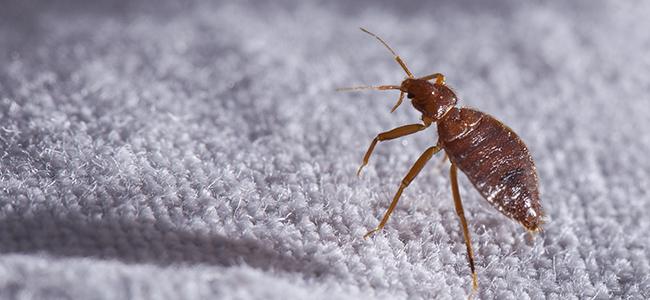
Fact vs. Myths: Bed Bugs In Washington D.C.
01/20/2022
Bed bugs are small parasitic pests that often resemble an apple seed to the naked eye. They have a wingless, oval-shaped body with a reddish-brown ...
READ MORE >
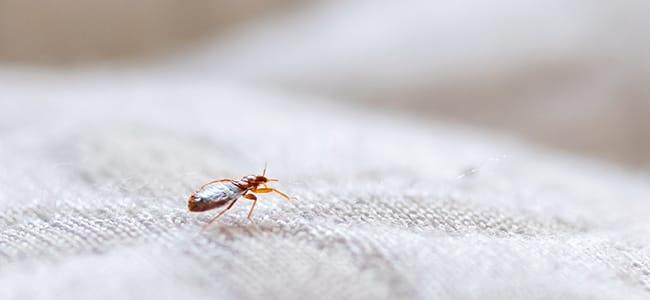
With the holidays upon us, you most likely find yourself busier than ever. Gifts must be bought, wrapped, and distributed. Menus must be planned, shopped for, and prepared. And plans must be made with family and friends. Whether you are staying home or traveling this holiday season, there’s no doubt that you have a lot to do to prepare for the holidays.
As much as you’d rather not add another thing to your plate, this time before the holiday is upon us is an important consideration this time of year. We're all traveling, shopping, visiting, and returning home thus increasing the potential for bed bugs to hitch a ride on our clothes or belongings. Bed bugs are not like most other bugs in the way they go about infesting a home, so the way you work to prevent them must be different too.
One of the benefits of living in an area with cold winters is that once summer is over, bugs all but disappear. Because of that, you may assume that bed bugs follow the same rules. It’s true that bed bugs love the heat and are most active in the summer months. However, because they live indoors, they don’t die off in the winter.
Furthermore, they are able to withstand cold temperatures, remaining active in temperatures as low as 46 degrees Fahrenheit and surviving temperatures even colder than that for several days. This ability allows them to move from place to place, even during the winter months.
Contrary to popular belief, what causes bed bugs to infest your DC home has nothing to do with dirt, grime, clutter, or overall cleanliness. Bed bugs have long been considered as creatures only found in filthy accommodations, like low quality hotels or dirty, unhygienic apartment buildings, but that’s simply not the case. Bed bugs are just as likely to end up in a prestigious five star hotel or a spotless home as they are in an unsanitary location.
To understand how bed bugs can end up in such diverse areas, it’s important to understand how they find you in the first place. As discussed, they don’t only stick to dirty places, and unlike most other bugs, they don’t infest your home by being in and around your yard and finding their way inside. They can’t fly into your house because they don’t fly. They can’t hop into your house because they don’t jump. Instead, the way they get into DC homes is by using their skills as first class hitchhikers.
One of a bed bug’s greatest skills is its ability to hitch a ride on a person’s clothing, shoes, bags, luggage, or anything else they can get on or into. Bed bugs are excellent at climbing on board completely undetected and staying out of sight until they can safely crawl off into whatever new location they deem as home. This means that bed bugs could crawl on you any time you go out in public. It also makes it possible for anyone who enters your home to bring bed bugs inside with them.
Since the holidays are such an active time of year for travel, bed bug activity tends to increase at this time of year as well. While summer remains the most active time of year for bed bugs due to the heat and the large number of family vacations that take place during those months, the holiday season comes in second.
As a result of their incognito travel behavior, keeping bed bugs out of your home is difficult, in spite of your best efforts. You must be vigilant every day and every time any person or item enters your home. If you plan to host holiday visitors this season, you have several options to choose from when deciding how cautious to be in your fight against bed bugs.
First, you’ll want to ensure that your home is free of bed bugs before any visitors arrive. This will not only aid in early detection should a guest bring bed bugs into your home, but will also ensure the safety of your visitors. As much as you don’t want them to bring bed bugs into your house, you also don’t want to send them home with bed bugs that were already there.
To search for bed bugs, begin in the bedrooms. Bed bugs can be found in any room in your home, but since they usually feed at night and require a host to do so, they are most often found in the rooms where people sleep.
If your search comes up clean, you can be relatively certain that you do not have a bed bug infestation. If you do see signs of bed bugs, begin treatment immediately with the help of a professional.
Once you’ve determined that you don’t have a bed bug infestation, you can go several routes to keep them out of your home when guests arrive. Unfortunately, the most effective way to prevent them requires extreme measures that many hosts and visitors alike may find rude. You must determine what you’re comfortable with and go from there.
The best way to make sure that bed bugs don’t get into your house requires you to inspect everything and everyone that comes inside before it gets through the door. By carefully checking over the clothing someone is wearing and searching through bags, luggage, and anything they’re carrying, you can be relatively sure that you’re not letting bed bugs into your house. Although this method is not 100% effective since bed bugs are very good at hiding, it’s certainly more effective than not checking at all. Unfortunately, such a method is also quite invasive and could be taken as insulting by any visitors your invite into your home.
The less invasive and rude method of trying to prevent a bed bug infestation is to check for bed bugs immediately after your guests leave and then at regular intervals following their stay. While this will not prevent a bed bug infestation, since any evidence of bed bugs that you find will now be in your home, it will allow you to discover the infestation in its earliest stages, making treatment much easier.
You may think your house is safe if no one is visiting you for the holidays, but if you plan to go somewhere this season, it’s just as likely that you’ll pick up bed bugs wherever you go, then bring them home with you. Thankfully, it’s not quite as difficult to prevent a bed bug infestation when you’re the one doing the traveling.
First, remember that it doesn’t matter where you plan to stay; any place could have bed bugs, from the ritziest hotel to the dirtiest house. That means that you should check your accommodations, no matter what.
Upon your arrival, wait to bring your luggage into your room until you’ve had a chance to inspect the room. If that’s not possible, bring it inside, but place it up off the floor, preferably on a non-upholstered surface, and don’t open any of it. Then do a thorough check of the room.
If the room appears to be free of bed bugs, still keep your luggage up off the floor for the remainder of your stay as an added precaution. Once you’ve returned home, you’ll also want to take a couple more steps to ensure you haven’t accidentally brought bed bugs home with you.
If you’ve felt itchy while reading this article, you’re not alone. Just the thought of some bugs are enough to cause that reaction. However, it’s important to understand the risks associated with an actual bed bug infestation in order to know exactly what you’ll be dealing with if you end up with one.
The good news is that bed bugs are not known to transmit any diseases. Unlike ticks or mosquitoes, you won’t contract Lyme disease or West Nile virus from bed bugs.. They do, however, bite and leave behind itchy red welts. Though rare, some people can develop an allergic reaction to these bites. Furthermore, excessive scratching of these bites can lead to secondary infections.
The biggest problem when it comes to bed bugs is the stress they cause homeowners. Earned or not, there is a social stigma attached to a bed bug infestation that will cause distress for those affected by it. It’s not uncommon to deal with insomnia during a bed bug infestation. Further stress will come with deciding how to eliminate the infestation and ensuring that it’s fully taken care of, as well as the strain an infestation can put on your finances.
If you have found signs of a bed bug infestation in your home, you’ll be happy to know that it is treatable. However, attempting to do it yourself is not a good way to go. DIY treatments can not reach into all the areas where bed bugs hide, which leaves bed bugs behind after the treatment is complete. Since they can go months without eating, this will leave you with a returning bed bug infestation in the months to come. Not only that, but attempting to treat a bed bug infestation on your own can be dangerous if you use chemicals. Applying chemicals in the wrong amount or in an incorrect manner could put you or your family at risk.
Instead, professional treatment is always necessary for a bed bug infestation. Experienced entomologists from American Pest have developed a bed bug treatment plan that will eliminate your bed bug problem in just one day. Using state of the art heat treatment methods that are safe for your home and deadly for bed bugs, our expertly trained and licensed pest control professionals will treat your home in a way that eliminates bed bugs in every stage of development. This ensures that there will not be a resurgence in the weeks or months to come.
You can trust American Pest to eliminate your bed bug problem efficiently and effectively. To schedule your initial bed bug inspection, contact us today.

01/20/2022
Bed bugs are small parasitic pests that often resemble an apple seed to the naked eye. They have a wingless, oval-shaped body with a reddish-brown ...
READ MORE >
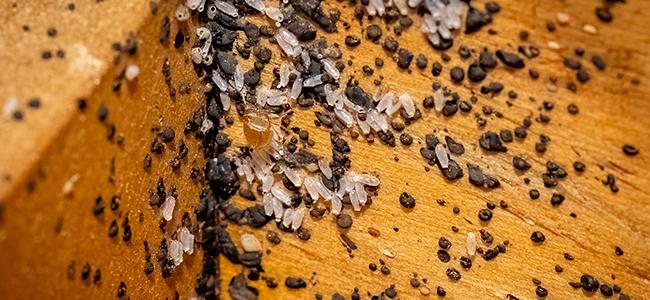
12/03/2021
Bed bugs can be difficult to identify, but this guide is here to help you tell them apart from other pests in Washington D.C. Read on to get the ma...
READ MORE >
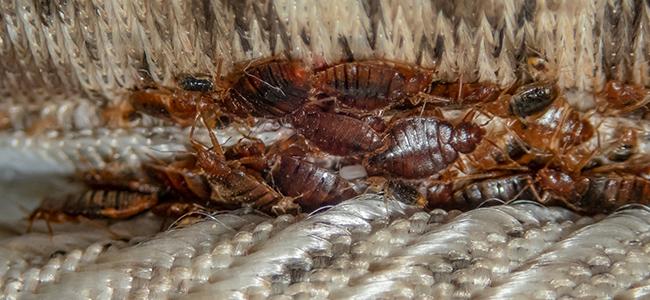
11/15/2021
Bed bugs may be small, but they can often cause major problems once they infest your Maryland home. Contact the professionals a...
READ MORE >
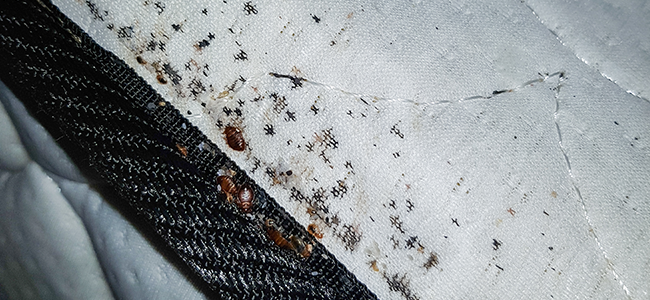
10/30/2021
Bed bugs can appear in almost any residential environment, from communal living to busy family homes. Contrary to popular belief, bed bugs do not c...
READ MORE >

Protect your home and family from nuisance and potentially damaging pests with a Preferred Care home pest control plan. Starting at $49/month

Don't let the bed bugs bite a second longer. Contact American Pest for the most comprehensive bed bug control in the industry. Learn More

Our certified rodent control pros will put an end to your frustration by getting rid of rats and mice inside your home. Learn More

Say goodbye to wood-destroying termites in your home when you contact American Pest for expert termite control. Learn More

Trust American Pest to deliver professional backyard tick control services that are guaranteed to get results. Learn More

Don't spend the warm-weather season indoors, find out how American Pest's professional treatments get rid of mosquitoes. Learn More
Fill out the form and recieve feedback in less than 5 minutes. For immediate service please call.